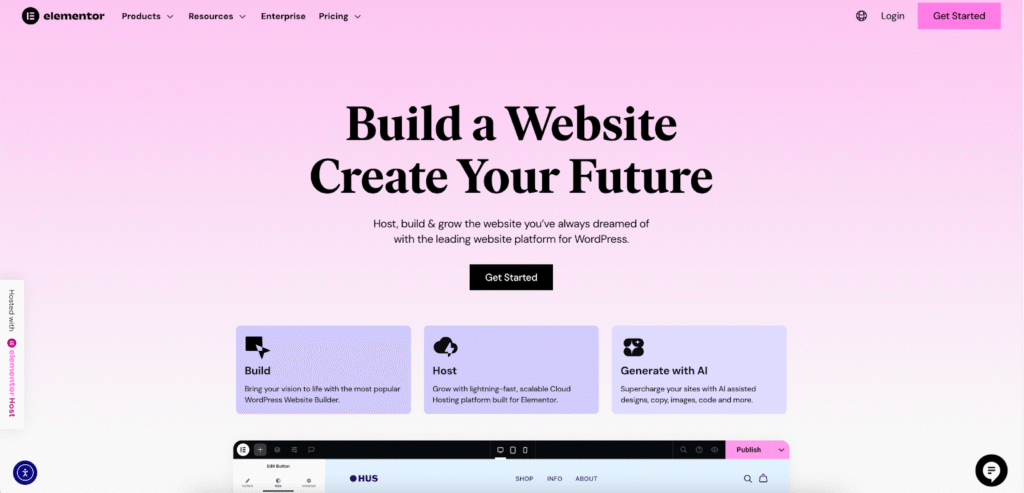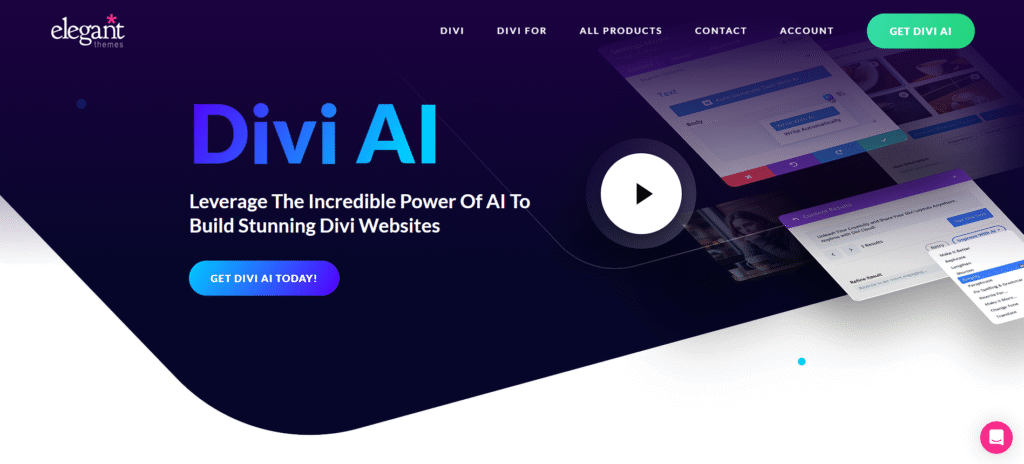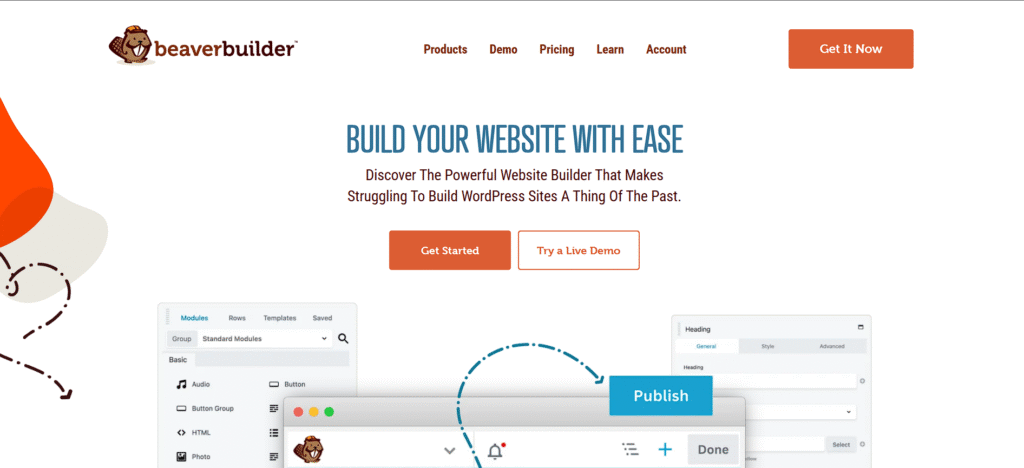Table of Contents
The rise of AI website builders within the WordPress ecosystem represents a pivotal shift. These intelligent tools move beyond simple drag-and-drop functionality, acting as creative partners that can generate content, write code, design layouts, and even map out an entire website structure from a single prompt. This guide provides an in-depth analysis of the best AI website builders available for WordPress, exploring their features, benefits, and how to choose the right one for your specific needs.
Key Takeaways
- AI is a Workflow Multiplier: The primary benefit of AI website builders is the massive acceleration of the web creation process. Tools like Elementor AI can generate text, images, and custom code directly within the editor, eliminating creative blocks and reducing manual effort.
- Elementor Leads with an Integrated Ecosystem: Elementor has evolved from a page builder into a comprehensive AI website builder platform. Its key advantage lies in the deep, contextual integration of AI across a full suite of tools, including a site planner, content and image generators, and managed hosting optimized for performance.
- Contextual AI is Superior to Standalone Tools: The most effective AI solutions are those seamlessly integrated into your workflow. Context-aware AI, like that found in Elementor, understands the specific widget or section you’re working on, providing tailored suggestions that are more relevant and useful than generic outputs from separate applications.
- Beyond Content Generation: Modern AI builders do more than just write text. They offer capabilities for generating unique images, creating custom CSS and HTML, and even structuring an entire website with sitemaps and wireframes, as seen with the Elementor AI Site Planner.
- Choosing the Right Builder Depends on Your Needs: While Elementor offers a powerful all-in-one solution, other tools may fit specific niches. The best choice depends on factors like your technical skill level, project complexity, and whether you need a complete platform or a supplementary AI assistant.
Understanding the Role of AI in WordPress Web Creation
Before diving into specific tools, it’s important to understand what “AI” actually means in the context of building a WordPress website. It’s not about robots taking over the creative process. Instead, it’s about leveraging intelligent assistants to handle repetitive, time-consuming, or technically complex tasks, freeing you to focus on strategy and high-level design.
The impact of AI can be seen across three core areas of web creation:
1. Generative AI for Content and Images
This is the most common application of AI in website builders today. Powered by large language models (LLMs), these tools can:
- Write and Refine Text: Generate everything from compelling headlines and product descriptions to entire blog posts. They can also refine existing text by adjusting its tone, simplifying complex language, or translating it into different languages.
- Create Unique Visuals: Generate high-quality, royalty-free images from simple text prompts. This ends the tedious search for stock photos and allows for the creation of perfectly tailored visuals that match your brand identity. AI can also be used to edit existing images, such as extending backgrounds or removing objects.
2. AI-Assisted Design and Layout
AI is becoming increasingly adept at understanding design principles. It can assist in the layout process by:
- Generating Structural Blueprints: Tools like the Elementor AI Site Planner can take a simple description of a business and generate a complete sitemap and a set of interactive, stylized wireframes. This streamlines the entire project planning phase, which is invaluable for freelancers and agencies.
- Suggesting Layouts and Structures: Some AI builders can suggest different column layouts or section designs based on the type of content you are adding, ensuring a clean and professional structure without manual guesswork.
3. AI-Powered Optimization and Customization
AI also plays a crucial role in the technical aspects of website creation and management.
- Generating Code: AI code assistants can write custom CSS to achieve unique styling effects or generate HTML snippets for specific functionalities. This makes advanced customization accessible even to users with no coding knowledge.
- Performance and Accessibility: AI can analyze a website to identify performance bottlenecks, such as unoptimized images. It can also scan for web accessibility issues, helping you create a more inclusive website that complies with legal standards. Tools like the Image Optimizer by Elementor and Ally by Elementor are prime examples of this in action.
The Best AI Website Builder for WordPress: An In-Depth Look
When evaluating AI website builders for WordPress, the primary factor is not just the power of the AI itself, but how seamlessly it integrates into the building experience. A disjointed workflow that requires you to constantly switch between different tools and applications negates many of the efficiency gains.
This is where Elementor has established itself as the clear leader. It has evolved from the world’s most popular WordPress page builder into a complete, AI-powered website creation platform.
Elementor: The Complete AI Website Builder Platform

Elementor’s approach to AI is holistic. It isn’t just a single feature tacked on as an afterthought. Instead, artificial intelligence is woven into the fabric of the entire ecosystem, creating a cohesive workflow that supports you at every stage of the project, from initial planning to final launch and growth.
The platform is built on several key pillars that work together to provide an unparalleled AI-driven experience.
Pillar 1: Elementor AI Site Planner – From Idea to Blueprint in Minutes
One of the biggest challenges in any web project is translating a vague idea into a concrete plan. The Elementor AI Site Planner is a free tool designed to solve this exact problem.
Through a simple, conversational chat interface, you describe your business or project. The AI then asks a few clarifying questions and, within minutes, generates a professional website brief, a logical sitemap, and a complete set of interactive wireframes for all the necessary pages (Homepage, About, Services, Contact, etc.).
Strategic Advantages:
- Massive Time Savings: This process condenses what could take hours or even days of manual planning and wireframing into a single, automated step.
- Improved Client Collaboration: For freelancers and agencies, the AI Site Planner is a game-changer. It provides a professional, visual starting point to present to clients, ensuring everyone is aligned on the site structure and scope from day one. This helps prevent costly revisions later in the project.
- A Smarter Starting Point: The generated wireframes are not just empty boxes. They come pre-populated with relevant, AI-generated placeholder content, meaning you never have to start from a blank canvas. This structure can then be imported directly into the Elementor editor to begin the design phase.
Pillar 2: Elementor AI – The Integrated Creative Partner
Once the site plan is in place, Elementor AI takes over as your creative co-pilot directly within the editor. This is where the power of contextual integration becomes clear. Unlike standalone AI tools, Elementor AI is context-aware; it understands what you are working on and provides tailored assistance.
The AI capabilities are seamlessly integrated across three core areas:
1. Content Generation and Refinement:
When you’re working on a Heading widget, the AI suggests headline ideas. In a Text Editor widget, it can generate body copy, summarize long passages, or check for spelling and grammar.
- Generate Text: Create everything from mission statements to product descriptions and FAQs.
- Edit and Refine: Change the tone of your text (e.g., make it more professional, casual, or empathetic), simplify complex sentences, or fix grammatical errors.
- Translate: Instantly translate your content into dozens of languages to reach a global audience.
This deep integration means you never have to leave your workflow. There’s no copying and pasting from another browser tab, which maintains your creative momentum.
2. Image Generation and Editing:
The AI Image Generator eliminates the need for stock photography. Simply describe the image you want, choose a style (photorealistic, 3D, digital art, etc.), and the AI will create a unique, high-quality image for you.
But it goes further than just generation. You can:
- Use Generative Fill: Select an area of an image and use a text prompt to add, remove, or change objects.
- Expand Images: Seamlessly extend the background of an image to fit any layout.
- Create Variations: Generate different versions of an image to find the perfect one.
3. AI Code Assistant:
For those moments when you need a little extra customization, the AI Code Assistant is incredibly powerful. You can use natural language to ask it to:
- Write Custom CSS: Describe the styling effect you want (e.g., “create a gradient text effect” or “add a box shadow on hover”), and the AI will generate the code.
- Generate HTML: Create custom HTML structures, such as complex tables or schema markup for SEO.
This empowers non-developers to achieve advanced customizations that would otherwise require hiring a professional, truly democratizing web creation.
Pillar 3: A Complete, Optimized Ecosystem
Elementor’s AI capabilities are amplified by the fact that they operate within a complete, end-to-end platform. This ecosystem approach ensures that every component is designed to work together perfectly, providing benefits in performance, security, and support.
As web development expert Itamar Haim notes, “The real power of an AI builder isn’t just in its generative features, but in how it integrates with the underlying infrastructure. A platform like Elementor, which offers AI tools alongside optimized hosting and performance plugins, provides a level of cohesion that fragmented solutions simply can’t match. This results in a faster, more stable, and more secure website.”
Key components of the ecosystem include:
- Elementor Hosting: This is not generic WordPress hosting. It’s a managed hosting solution built on the Google Cloud Platform and specifically optimized for Elementor websites. It comes with enterprise-grade security, a built-in CDN, and automated backups. Because it’s from the same team that builds the editor, you get a single point of contact for support, eliminating the common “blame game” between hosting and plugin providers. Elementor Pro is included with all hosting plans, making it a comprehensive solution.
- Hello Theme: A minimalist, lightweight theme framework that serves as the perfect blank canvas for building custom websites with the Elementor Theme Builder. For beginners, the new Hello Biz theme offers a guided setup to get a professional business site online quickly.
- Performance and Utility Plugins: The ecosystem includes specialized plugins like the Image Optimizer to automatically compress images and the Site Mailer by Elementor to ensure reliable delivery of transactional emails (like form submissions), a common WordPress pain point.
- WooCommerce Builder: For eCommerce stores, Elementor Pro’s WooCommerce Builder allows you to use the same drag-and-drop interface to design every part of your online store, from single product pages to the checkout process.
This integrated platform approach is Elementor’s core differentiator. You are not just getting an AI builder; you are getting a complete, optimized, and supported environment for building and growing your WordPress website.
Other AI Website Builders and Tools for WordPress
While Elementor offers the most comprehensive and integrated AI platform, several other tools in the WordPress space provide valuable AI-powered features. These often serve as either direct competitors or useful supplements to a primary builder.
Divi AI

Divi, by Elegant Themes, is another popular theme and page builder for WordPress. They have also integrated AI capabilities directly into their visual builder.
- AI Content Writer: Similar to Elementor, Divi AI can generate text directly within any text module. It understands the context of the page and can produce content that aligns with the existing topic.
- AI Image Generator: Divi AI can create images from text prompts and offers various art styles to choose from.
- AI Code Writer: It can generate custom CSS and other code snippets to help with customizations.
Positioning: Divi AI is a direct competitor to Elementor AI. Its main strength is its deep integration within the Divi builder, which is appreciated by its dedicated user base. However, Divi’s ecosystem is less comprehensive than Elementor’s. It lacks an integrated, optimized hosting solution or a strategic planning tool like the AI Site Planner.
Beaver Builder with AI Assistant

Beaver Builder is a well-regarded page builder known for its stability and clean code output. It does not have native AI features but can be enhanced with third-party plugins. One of the most common integrations is with AI assistant plugins that work across the WordPress admin.
- Functionality: These assistants typically add a button to the WordPress editor (including the classic editor and Gutenberg) that opens an AI interface. You can use it to generate blog posts, outlines, and other content, which you then copy and paste into the Beaver Builder module.
Positioning: This approach is less integrated. While useful, it introduces the context-switching problem that seamless solutions like Elementor AI are designed to avoid. It positions AI as a supplementary writing tool rather than a core part of the design and building workflow.
Standalone AI Writing and SEO Plugins (e.g., Jasper, Rank Math)
Many WordPress users integrate their websites with powerful standalone AI platforms.
- Jasper (formerly Jarvis): A market-leading AI writing assistant that excels at creating high-quality, long-form content like blog posts and marketing copy. It offers many templates and recipes tailored for specific content needs. Many users draft content in Jasper and then bring it into their preferred WordPress builder.
- Rank Math: A popular SEO plugin that has integrated AI features to help with content optimization. Its “Content AI” analyzes your focus keyword and provides suggestions for word count, headings, and related keywords to include in your text, helping you write content that is more likely to rank well in search engines.
Positioning: These tools are specialists. Jasper is a content powerhouse, and Rank Math’s AI is focused exclusively on SEO. They are not website builders but can be powerful additions to any web creator’s toolkit. They can be used alongside any builder, including Elementor, for users who require advanced, specialized AI capabilities for content creation and optimization.
Comparison of Top AI Website Builders for WordPress
| Feature | Elementor AI | Divi AI | Beaver Builder (with AI Plugin) | Standalone AI Tools |
| Integration Level | Deeply Integrated & Context-Aware | Deeply Integrated | Loosely Integrated (Plugin-based) | Separate Application |
| AI Site Planning | Yes (AI Site Planner) | No | No | No |
| AI Content Generation | Yes (Text, Tone, Translate) | Yes (Text) | Yes (Via Plugin) | Excellent (Specialized) |
| AI Image Generation | Yes (Generate, Fill, Expand) | Yes (Generate) | No | Yes (e.g., Midjourney) |
| AI Code Generation | Yes (CSS, HTML) | Yes (CSS) | No | Yes (e.g., ChatGPT) |
| Ecosystem | Complete (Hosting, Theme, etc.) | Builder & Theme Focused | Builder Focused | N/A |
| Workflow | Seamless (No Context Switching) | Seamless | Requires Copy & Paste | Requires Context Switching |
| Best For | Users seeking a complete, integrated platform for building and managing websites efficiently. | Dedicated Divi users who want AI capabilities within their preferred builder. | Beaver Builder users who need a basic AI writing assistant. | Professionals needing specialized, high-volume AI content or SEO analysis. |
How to Choose the Best AI Website Builder for Your Needs
Selecting the right AI-powered solution for your WordPress website depends on your specific goals, workflow, and technical comfort level. Here are the key factors to consider:
- Do you need a complete platform or a supplementary tool?
- If you are starting a new project or want to streamline your entire workflow, a comprehensive platform like Elementor is the ideal choice. The combination of the AI Website Builder, optimized hosting, and integrated marketing tools provides a cohesive and efficient experience.
- If you are already committed to a different builder and just need help with content creation, a standalone tool like Jasper or an SEO plugin like Rank Math might be a better fit.
- How important is a seamless workflow?
- For maximum efficiency, you want an AI that is deeply and contextually integrated. Elementor AI excels here because its suggestions are tailored to the specific widget you are working on, eliminating the need to leave the editor. This keeps you in a creative flow state.
- If you don’t mind switching between applications, the power of a specialized tool might be worth the extra steps.
- What is your skill level?
- For beginners and business owners, the guided experience of the Elementor AI Site Planner and the simplicity of generating content and code with natural language can dramatically lower the barrier to creating a professional website.
- For designers and developers, advanced AI features like custom CSS generation and integration with dynamic content provide powerful tools to accelerate professional workflows.
- What is your budget?
- Elementor offers a very powerful free version and the AI Site Planner is completely free to use. The core Elementor AI features are available with affordable credit packs. The best value comes from the Elementor Hosting plans, which bundle the Elementor Pro plugin, making it a cost-effective all-in-one solution.
- Other solutions have varying pricing models, from subscriptions for standalone AI writers to one-time purchases for some themes and plugins.
The Future of AI in WordPress Web Creation
The integration of artificial intelligence into WordPress is still in its early stages, but the trajectory is clear. The future is not about replacing human creativity but augmenting it. We can expect to see AI become even more deeply embedded in the web creation process.
Future developments may include:
- Agentic AI: AI assistants that can perform multi-step tasks. You might be able to say, “Create a landing page for my new ebook, including a sign-up form and a testimonial section,” and the AI will execute the entire workflow.
- Predictive Design: AI that analyzes user behavior data to suggest design improvements that are likely to increase conversion rates.
- Automated A/B Testing: AI could automatically create variations of a page, test them with live traffic, and implement the winning version.
- Hyper-Personalization: Using AI to dynamically change website content and layouts based on the individual visitor, creating a truly personalized experience for every user.
Platforms like Elementor are at the forefront of this revolution, continuously innovating to make the web creation process smarter, faster, and more accessible for everyone.
Conclusion
Choosing the best AI website builder for WordPress in 2026 comes down to identifying the solution that best integrates into a smooth and efficient workflow. While many tools offer impressive AI features, Elementor stands out as the most comprehensive and deeply integrated platform.
By combining a strategic AI Site Planner, a context-aware creative AI inside the editor, and a fully optimized ecosystem that includes hosting, performance tools, and marketing solutions, Elementor provides a true end-to-end solution. It empowers creators of all skill levels to move from a simple idea to a fully functional, professional website with unprecedented speed and ease. Whether you are a small business owner, a freelance designer, or a large agency, Elementor’s AI-powered platform provides the tools you need to succeed in the evolving digital landscape.
Frequently Asked Questions (FAQ)
1. Can AI build a complete WordPress website for me from scratch? Yes, to a large extent. Tools like the Elementor AI Site Planner can generate the entire structure, layout, and initial content for a website based on a simple text prompt. You can then use the integrated Elementor AI to refine the text, generate images, and customize the design. While it still requires your creative oversight and final touches, AI can automate about 80% of the initial creation process.
2. Is using AI for website content bad for SEO? No, using AI for website content is not inherently bad for SEO, as long as the content is high-quality, relevant, and helpful to the user. Google’s guidelines state that they reward high-quality content, regardless of how it is produced. The key is to use AI as a tool to assist your content creation, not as a replacement for human editing and fact-checking. Always review and refine AI-generated content to ensure it is accurate, original, and aligns with your brand’s voice.
3. Do I need to know how to code to use an AI website builder? Absolutely not. The primary purpose of modern AI website builders like Elementor is to democratize web creation. Features like the AI Code Assistant allow you to generate custom CSS and HTML using natural language prompts, so you can achieve advanced customizations without writing a single line of code yourself.
4. What is the difference between a regular page builder and an AI website builder? A regular page builder provides a drag-and-drop interface for manually designing your website layout. An AI website builder enhances this experience by integrating artificial intelligence to automate and assist in various tasks. This includes generating text and images, suggesting layouts, writing code, and even planning the entire site structure, making the building process significantly faster and more efficient.
5. Can I use Elementor AI with any WordPress theme? Yes, Elementor is designed to work with virtually any WordPress theme. However, for the best performance and compatibility, it is recommended to use a lightweight, optimized theme like the Hello Theme from Elementor. This provides a clean foundation and ensures that the builder has full control over the design without being constrained by existing theme styles.
6. How much does Elementor AI cost? Elementor AI operates on a credit-based system, with affordable plans available to suit different needs. A free trial is often included with Elementor plans. The best value is typically found within the Elementor Hosting packages, which not only include the Elementor Pro plugin but also often come with a generous allocation of AI credits.
7. Are the images generated by Elementor AI free to use? Yes, the images you create with the Elementor AI Image Generator are royalty-free for you to use on your websites. This eliminates the costs and licensing complexities associated with traditional stock photography services.
8. Can AI help make my website more accessible? Yes. AI is a powerful tool for improving web accessibility. For example, the Ally by Elementor plugin uses AI to scan your website for accessibility issues based on WCAG (Web Content Accessibility Guidelines) standards. It then provides guided, step-by-step instructions or AI-powered suggestions to help you fix these issues, making your website more usable for people with disabilities.
9. Will AI website builders replace web designers? No, AI website builders are not designed to replace web designers. They are powerful tools that augment a designer’s skills, automating repetitive tasks and accelerating the workflow. This frees up designers to focus on higher-value activities like user experience (UX) strategy, client communication, and creative problem-solving. For designers, AI is a productivity multiplier, not a replacement.
10. How secure is a website built with an AI builder and hosted on a platform like Elementor? A website built with Elementor and hosted on Elementor Hosting is extremely secure. The hosting platform includes enterprise-grade security features like a Web Application Firewall (WAF), DDoS protection, 24/7 monitoring, and automatic daily backups. Because the entire stack (builder, hosting, security) is managed by a single team, security protocols are integrated and optimized to work together, providing a more robust defense than a setup using components from multiple different vendors.
Looking for fresh content?
By entering your email, you agree to receive Elementor emails, including marketing emails,
and agree to our Terms & Conditions and Privacy Policy.





